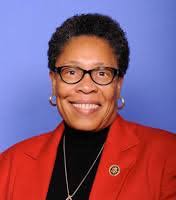 Clevelandurbannews.com and Kathywraycolemanonlinenewsblog.com, Ohio's most read Black digital newspaper and Black blog with some 5 million views on Google Plus alone.Tel: (216) 659-0473 and Email: editor@clevelandurbannews.com.
Clevelandurbannews.com and Kathywraycolemanonlinenewsblog.com, Ohio's most read Black digital newspaper and Black blog with some 5 million views on Google Plus alone.Tel: (216) 659-0473 and Email: editor@clevelandurbannews.com.
CLEVELANDURBANNEWS.COM-WASHINGTON, D.C. - The Subcommittee on Elections of the Committee on House Administration will hold a field hearing on voting rights and elections Tuesday, Oct 1, 2019 at Phoenix College in Phoenix, Arizona, a hearing chaired by Ohio congresswoman Marcia L. Fudge, a Warrensville Heights Democrat whose largely Black 11th congressional district includes Cleveland and one of two Blacks in Congress from Ohio.
CLICK HERE TO WATCH THE STREAMLINED OCTOBER 1 FIELD HEARING
Fudge has said the overall purpose of the field hearings is to tackle voter discrimination and voter fraud nationwide, and to address the Supreme Court’s concerns about the data supporting Section 4 of the Voting Rights Act.
Working towards the full implementation of Section 5 of the Voting RIghts Act is also a major goal, the congresswoman has said, among others.
Arizona is the most recent stop for the evidentiary field hearings, others of which have been held this year in the states of North Dakota, North Carolina, Florida, Ohio, and Georgia.
Other congressional members of the subcommittee are Democratic Reps G.K. Butterfield of North Carolina and Pete Aguilar of California, who will also attend, and Rep Rodney Davis, a Republican congressman from Illinois.
A former chair of the Congressional Black Caucus as is Butterfield, Fudge was appointed subcommittee chair by Democratic House Speaker Nancy Pelosi, who resurrected the previously defunct subcommittee.Click Here To Go To The Subcommittee On Elections of the Committee on House Administration Website
Other members of Congress who will attend the field hearing in Arizona on Tuesday include Reps. Ruben Gallego, Greg Stanton, and Raul Grijalva, and Republican Rep. Debbie Lesko.
The hearing comes as the 2020 presidential election nears and will examine voting rights and election administration issues facing both Arizona's Native American community and Arizonans statewide, as well as Arizona's practice of felon disenfranchisement.
Also at issue is the lack of ballot access for language minority populations.
Arizona's minority population has been disproportionately affected by widespread polling place closures.
The state of Arizona is 78% White.
Blacks or African Americans made up 3.4% of Arizona's population; of which 3.3% were non-Hispanic blacks. American Indians made up 4.5% of the state's population; of which 4.1% were non-Hispanic. Asian Americans made up 2.3% of the state's population. Pacific Islander Americans made up 0.1% of the state's population
Witnesses for the field hearing proceedings in Arizona are as follows:
Panel One:
Stephen Roe Lewis, Governor, Gila River Indian Community
Jonathan Nez, President, Navajo Nation
Panel Two:
Alex Gulotta, All Voting is Local
Darrell Hill, ACLU of Arizona
Patty Ferguson-Bohnee, Indian Legal Clinic, ASU Law School
Lorena C. Van Assche, Arizona State Advisory Committee, USCCR
Montserrat Arredondo, One Arizona
Michelle Ugenti-Rita, Arizona State Senator, District 23
A study conducted by the Leadership Conference found that of all states previously covered by Section 5 of the Voting Rights Act, Arizona has "the most widespread reduction in polling places.
Almost every county (13 of 15 counties) closed polling places since pre-clearance was removed, some on a staggering scale.
Maricopa County, which is 31 percent Latino, has closed 171 voting locations since 2012, the most of any county studied and more than the two next largest closers combined.
Reports surfaced during the 2016 primary elections detailing that voters in Maricopa County waited as long as five hours to cast their ballots, the 2016 general election going to President Donald Trump, a television personality and real estate mogul who, as the Republican nominee, edge Democratic nominee Hillary Clinton to win the presidency.
Arizona state law prohibits the practice of collecting ballots except under specific exemptions, and despite arguments this restriction disproportionately affects minority populations and Native American voters who live in remote areas.
Data also show that Native American voters have also had difficulty registering to vote because many reservation residents do not have a traditional street address and processes to accommodate these voters has led registrars to arbitrarily assign an inappropriate precinct.
The state of Arizona, via its Republican-dominated state legislature, has attempted to add proof of citizenship requirements to voter registration forms to no avail as the U.S. Supreme Court has held that the proof of citizenship requirement is inconsistent with the National Voter Registration Act.
But Arizona state lawmakers and its secretary of state contend the Supreme Court decision in Arizona vs. Inter Tribal Council of Arizona, a 7-2 decision, only applies to federal elections.
This has led to a dual registration process where citizens could register to vote with the federal registration form for federal elections only and would have to provide proof of citizenship to register to vote in state and local elections.
In a move that Congressional Democrats say specifically targets Arizona's immigrant population, copies of passports and birth certificates can be submitted by mail, but original copies of naturalization papers are required to be presented in person.
Clevelandurbannews.com and Kathywraycolemanonlinenewsblog.com, Ohio's most read Black digital newspaper and Black blog with some 5 million views on Google Plus alone.Tel: (216) 659-0473 and Email: editor@clevelandurbannews.com. Kathy Wray Coleman, editor-in-chief, and who trained for 17 years at the Call and Post Newspaper in Cleveland, Ohio. We interviewed former president Barack Obama one-on-one when he was campaigning for president. As to the Obama interview, CLICK HERE TO READ THE ENTIRE ARTICLE AT CLEVELAND URBAN NEWS.COM, OHIO'S LEADER IN BLACK DIGITAL NEWS.
| < Prev | Next > |
|---|








